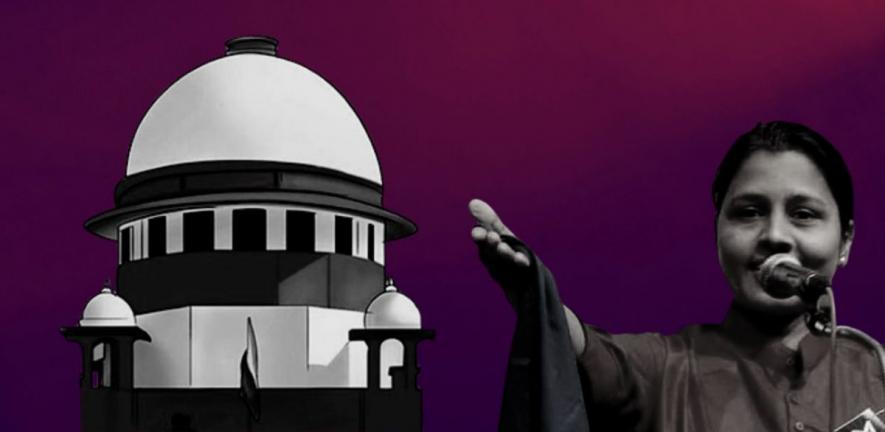Bhima Koregaon: SC Says Principles of Arun and Vernon Bail Judgment to Apply to Jyoti Jagtap

Image courtesy: The Leaflet
Today, the Supreme Court observed that the parameters set in the judgment granting bail to co-accused Vernon Gonsalves and Arun Ferreira will be applied to the bail plea of anti-caste activist and musical performer, Jyoti Jagtap.
A division Bench of the Supreme Court comprising Justices Aniruddha Bose and Sanjay Karol adjourned Jagtap’s plea for a grant of regular bail.
Jagtap is an accused in the Bhima Koregaon–Elgar Parishad case and charged under the Unlawful Activities (Prevention) Act, 1967 (UAPA).
Jagtap has been incarcerated as an undertrial since September 8, 2020, and is lodged at the Byculla jail in Mumbai.
Trade unionist and activist, Vernon Gonsalves; and lawyer and activist, Arun Ferreira were granted bail by the Supreme Court on July 28.
At the previous hearing, on September 21, the Bench comprising Justices Bose and Bela M. Trivedi had granted three weeks to Jagtap to file a rejoinder in support of her bail plea.
Today, the Bench decided to adjourn the hearing since the present Bench is not regular. Justice Karol is set to be a part of another Bench, Justice Bose noted.
Advocate Aparna Bhat, appearing for Jagtap, pointed out to the Bench that several of the co-accused persons in the Bhima Koregaon case have been granted bail.
Besides Gonsalves and Ferreira, on November 18 last year, the Bombay High Court granted bail to Dalit scholar, academic and activist, Dr Anand Teltumbde.
In respect of Jagtap, Bhat stated that the only allegation against her is that she had participated in an event around 10–12 years ago.
Justice Bose enquired whether the present bail plea was different from the other bail pleas of the co-accused in respect of which bail was granted.
To this, Additional Solicitor General K.M. Nataraj, appearing for the National Investigation Agency, replied in the affirmative.
Nataraj offered to prepare a table containing details of how Jyoti’s bail plea differed from other such judgments.
Justice Bose remarked that in the case of the National Investigation Agency versus Zahoor Ahmad Shah Watali (2019), the Supreme Court held that while adjudicating a bail plea, courts should admit evidence produced by the investigating agencies.
However, while granting bail to Gonsalves and Ferreira, the court decided to analyse the probative value of evidence relied upon by the agency, he said.
In respect of Jagtap, Justice Bose observed that as per the parameters set in the bail judgment of Gonsalves and Ferreira, the court will analyse whether the content of the recovered electronic evidence constitutes an offence under Chapters V and VI of the UAPA.
The matter has been adjourned for further hearing to November 30.
Background
On February 14, 2022, a special NIA court denied bail to Jagtap and three other co-accused in the Bhima Koregaon case. The court maintained that the accused had hatched a “serious conspiracy” to create unrest in the country.
On October 17, 2022, the Bombay High Court rejected her appeal which was filed against the Order of a special court under the National Investigation Agency, Act, dated February 14, 2022, under which her bail application was rejected.
According to the high court, Jagtap was involved in a “terrorist act” by organising the Elgar Parishad event and associating with prominent members of the banned organisation Communist Party of India (Maoist).
Trial is yet to begin in the Bhima Koregaon case. The prosecution has filed a chargesheet exceeding 5,000 pages and intends to cross-examine at least 200 witnesses. Several of the accused persons have now spent almost five years in judicial custody without trial.
Six of the accused persons, Sudha Bharadwaj, Varavara Rao, Anand Teltumbde, Vernon Gonsalves, Arun Ferreira and Mahesh Raut have managed to secure bail so far. Father Stan Swamy, who was a co-accused, passed away due to Covid in custody in June 2021 after incarceration of over seven months.
An investigation by Arsenal Consulting, a leading, independent expert firm on digital forensics, has revealed that sophisticated malware was used to plant the digital evidence that forms the basis for the prosecution’s case on the devices of two of the accused persons in the case, Gadling and Wilson.
Arsenal’s findings were published in four reports in 2021.
Sarah Thanawala is a staff writer at The Leaflet.
Get the latest reports & analysis with people's perspective on Protests, movements & deep analytical videos, discussions of the current affairs in your Telegram app. Subscribe to NewsClick's Telegram channel & get Real-Time updates on stories, as they get published on our website.
























